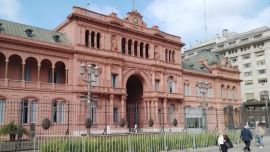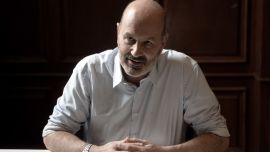My grandfather was murdered by Montoneros. How this affected my family can be easily guessed and need not be discussed here. Would I like justice to be done? Certainly. But not at the expense of truth. That is why many victims and relatives of victims of armed organisations neither feel represented by, nor do they endorse, Victoria Villarruel’s claims and views.
"For 40 years, the victims of terrorism were erased from memory and history; they were denied," said Villarruel last week during a much-debated event (Buenos Aires Times, September 5 and September 9, 2023). This is simply false. The fact that the Kirchnerite narrative of the 1970s was given more media visibility — either to promote it or to criticise it — doesn’t undermine an impressive body of work on political violence, available for decades, which encompasses, and at times addresses, the victims of the armed organisations.
One such instance is Oscar del Barco’s direct apology and plea for forgiveness to the victims, in a public text that received media attention, and which also included a call to former militants to follow suit. From different perspectives, a variety of activists, journalists, and academic researchers contributed to the exposure, and not the erasure, of the issues with which Villarruel is allegedly concerned.
Villarruel added, "The State guarantees the impunity" of the perpetrators (La Nación, September 5, 2023). Equally false. If Villarruel used "state" in its strictly legal sense, she ought to know that the State cannot be identified with a particular government official or a particular administration. If she meant "the government," the claim is still false. For, if the perpetrators haven’t been brought to Justice, it is because of the statute of limitations, and not because of partisan manipulation. Whether the relevant legislation should be changed — and statutes of limitations for certain crimes extended — is a different question, unrelated to "guarantees of impunity."
Probably, Villarruel made this claim alluding to her known legal tactic: to attempt to prove that the crimes of the armed organisations fall under the category of crimes against humanity, which are not prescribed. But this is a non-starter, and neither Kirchnerism nor the Argentine State are responsible for that. The crimes committed by Montoneros and Ejército Revolucionario del Pueblo (ERP) are not crimes against humanity. To claim otherwise implies distorting the truth.
Earlier, the speaker who introduced Villarruel referred to the number of victims of terrorism. He is quoted by La Nación as saying that "17,380 human beings were murdered, kidnapped, wounded; suffered bombs (sic)," or were in some sense victims of terrorist violence. This vagueness or ambiguity regarding who counts as "victim" is typical, and a similar imprecision characterises other aspects of her view. As Perfil and the Buenos Aires Times put it, "Villarruel’s strategy consists in maintaining a certain ambivalence about the crimes of the dictatorship, and instead shifting the conversation towards ‘the victims of terrorism’ of organisations like the Montoneros and the ERP (Perfil/Buenos Aires Times, September 5, 2023).”
Yet, Villarruel didn’t display much ambivalence when speaking of the dictatorship some time ago. “Truth be told, after the military coup … society was better protected," she said on live TV — with a degree of bluntness she took care not to display in her recent intervention. (Footage available at https://www.youtube.com/@coxarchive). So much for Villarruel’s ambiguity and ambivalence as rhetorical strategies to dodge the inquiry into her aims and intentions.
Moreover, as we are reminded in the same Perfil/Buenos Aires Times piece, in 2016 Villarruel maintained that the "scale of armed terrorist action makes denying a war incomprehensible." This assertion has been refuted from many angles. Suffice it to reread the pertinent sections of the digitised Diario del Juicio for a first, accessible argument that debunks the war theory. Currently, it is endorsed almost exclusively by military apologists. Granted, both the guerrilla organisations and the Armed Forces — as well as many segments of civil society — discussed these issues under the "figure" of war, using this term in a variety of senses, as Hugo Vezzetti and others have explained at length.
Certainly, Mrs. Villarruel is entitled to present her views in public fora. But, if it’s always advisable to engage in some form of dialogue to fine-tune one’s views and statements, this becomes a necessity when the ‘views’ in question are plagued by factual and conceptual mistakes, half-truths, and plain falsehoods. In the absence of such an instance — Villarruel declined to comment or answer questions about the event — let us quote an excerpt from Robert Cox’s August 28, 2011 column in the Buenos Aires Herald, in which he both demands justice for crimes such as that of J. A. Larrabure, and at the same time criticises Villarruel’s work in the following terms:
The example of decency and heroism that the message against hate and the noble principles that the Larrabure family represent have been tainted by an organisation that calls itself the Centro de Estudios Legales sobre Terrorismo y sus Víctimas (CELTYV). The name itself is suspect because it is so similar to the name and initials of Argentina’s leading human rights organisation, the Centro de Estudios Legales y Sociales (CELS), which was founded in 1979 by Emilio Mignone and Augusto Conte MacDonell. The president of CELTYV is Victoria Villarruel, a young lawyer without the experience or qualifications to head a human rights organisation. She has laid claim to the Larrabure epic, distorting its significance by exaggerating the crimes attributed to terror ism. In so doing, she is damaging the cause of human rights … This is the tactic of the Big Lie in action.
In sum, in the Manichean universe of Argentine politics, a figure who should be known for her defensible alleged aims, questionable views, and tenuous argumentation — but who is instead either idolised or loathed — decided to enter politics two years ago. And, riding the wave of radical shifts in public opinion, went from rookie politician to vice-presidential candidate in record time. All the worse for Argentina. For, after all, Cox’s 2011 reservations regarding both Villarruel’s truth-telling practices and her qualifications to lead a human rights organisation may well hold for her new position as a politician with chances to exercise the Executive Power.
* Gustavo Llarull, Ph.D.; Philosophy UC-Riverside (2007); Latin American Studies Cornell University (2017).
** The author’s grandfather, David Kraiselburd (editor of La Plata daily, El Día, and co-founder of the Noticias Argentinas news agency) was murdered by a Montoneros cell on July 17, 1974. During the dictatorship, another relative, an aunt, was kidnapped and disappeared by the Armed Forces, while her two children — abducted along with their mother — were found years later, and reunited with their father.




















Comments